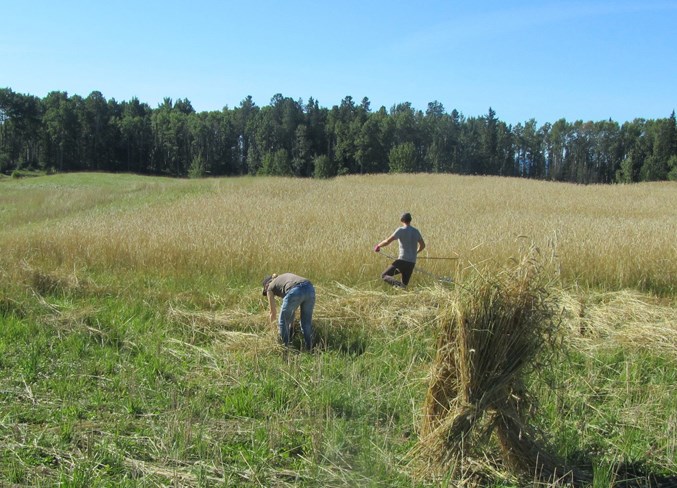For the operators of Little Loaves Farm, growing crops and tending livestock is an act of faith.
Little Loaves Farm has been in business for just a few years on a quarter section nestled north of Sundre.
The farm is an expansion of the market garden that Jerremie and Rita Clyde used to grow south of Calgary. He and Rita farm with Rita’s brothers, Michael and Stephen Poon.
“It’s kind of like expanding how much you garden, to a certain degree,” Jerremie said in an interview.
They started the farm because of their interest in growing and food security, as well as their work with organizations like the Primate’s World Relief and Development Fund. Also, their market garden kept expanding in size. Jerremie described it as gardening “in an ever increasing scale.”
While Jerremie grew up sometimes helping on his extended family’s farms, he said for Rita it’s a totally new experience.
The family divides its time between their home in Calgary and their home on the farm, depending on the season. Jerremie works part-time at the University of Calgary as an academic librarian.
“I think it works really well,” he said, noting that his library work, like farming, can be a bit seasonal. It means come the late spring and summer, he can spend a good deal of time at the farm.
A partnership with Thompson Small Farm near Bergen helped the family establish its yak herd and still helps look after them, especially in the winter months. The two farms share yak calves now.
“They’re quiet, fuzzy, very gentle,” Jerremie said of the yaks. He said yaks have a better cold tolerance and can use the pasture on their land better than cattle could, making them a great choice for Little Loaves Farm.
The Clydes' Christian faith – they attend the Anglican Church – inspired both the farm’s name and the approach they take to growing crops like rye, oats, some wheat, potatoes, peas and beans, and looking after their livestock.
"Loaves" is a reference to the miracles of loaves and fishes in the New Testament, where Jesus is able to use just a few loaves and fish to feed thousands.
“We liked that because we really feel … we farm in part because of a faith calling,” Jerremie said, then laughed, “And we always joke that if we produce any food here at all it will be a miracle.”
Their chemical-free, holistic approach to farming, with an eye to increasing biodiversity, is derived from the biblical concept of “shalam.”
A Hebrew word often translated as “peace,” Clyde said the definition goes deeper than that – a “flourishing of all life,” he said.
“What we really want to do is increase shalam,” he said.
To that end, they have several different crops, plus livestock, and they work with small equipment like European foot tractors and horses, which lets their children be safe to roam the land.
“It’s all done to try and … increase biodiversity on the site, shalam, so we make sure that there’s as much life as possible and it’s flourishing as much as possible,” Jerremie said.
Agriculture in the Bible goes back as far as the first book, Genesis, and the story of Adam, he noted. So they see a theological reason for working in agriculture and thinking about food security.
While the farm is not certified organic, Jerremie said that’s mostly a matter of paperwork. They don’t use chemicals, and try to keep a light carbon footprint for their operation. In addition to using equipment like so-called foot tractors or horses, they keep their crop plots small.
“It just means we have to be really on top of the timing,” he said.
Little Loaves Farm products are available to consumers via the collaborative group, YYC Growers and Distributors. They work together to bring just under 20 farms’ products to markets and have a community-supported agriculture (CSA) box program.
Jerremie said the group grew out of participants at a farmers market in the Sunnyside neighbourhood in Calgary, where the Clydes sold their market garden produce.
“We concentrate on the growing and everything else, and then we get to collaborate with the other farms on the marketing and sales,” he said.
The collaboration means some of the challenges inherent in a CSA program, like a bad harvest, are lessened.
“You also get the benefit of there being 18 farms there, so no matter how bad a year is, your CSA box … is actually full,” he said.
The farmers work with various faith, agriculture and food security groups, often educating others about the topics. They also donate 10 per cent of the proceeds from their annual harvest to the Canadian Foodgrains Bank. That organization gets matching dollars from the federal government and partners with various church denominations to help with projects in other countries.
“The dollars get spent in that farming community,” Jerremie said.
He likes encouraging food security abroad and at home, one of the reasons the farm takes its chemical-free, holistic approach.
“I suppose one reason we go organic is that I don’t buy into the whole ‘we need industrial (agriculture) to feed the world,’” Jerremie said in an email. “We need farmers though, more of them here, and even more and better trained and equipped farmers elsewhere, so communities can feed themselves.”
Overall, Jerremie has found the shift to farming to be a fulfilling one.
He gets to work intellectually as an academic librarian, but at the farm he gets to see physical results of his hard work.
“It’s super rewarding,” he said.



